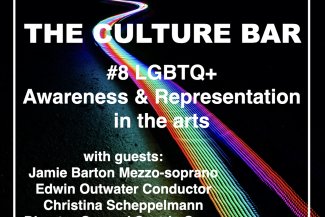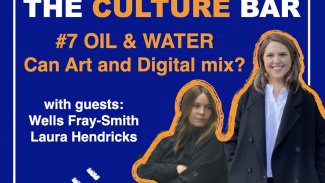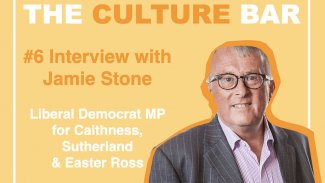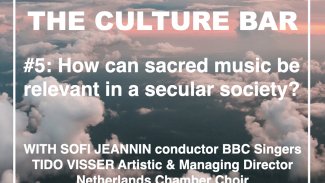The Culture Bar No.8: Under the Spotlight — LGBTQ+ Awareness & representation in the arts
24/2/2021

Under the spotlight mini-series episode
In this special podcast episode, we celebrate LGBTQ+ awareness month (February 2021) and discuss LGBTQ+ awareness and representation in the arts.
In this lively conversation, we are thrilled to be joined by three wonderful panellists:
Mezzo-soprano Jamie Barton who, in 2019, lit up the Last Night of the Proms as well as being named Personality of the Year by the BBC Music Magazine Awards. Jamie has also received the Richard Tucker Award, and won the BBC Cardiff Singer of the World competition (both main and song prizes).
Edwin Outwater is a conductor, curator, producer, and all-around polymath. Edwin is Music Director at the San Francisco Conservatory of Music, and has collaborated with the likes of celebrated drag artist Peaches Christ, and heavy metal bands, such as Metallica.
Christina Scheppelmann is one of only two women heading up a major opera company in the United States. She is currently General Director of Seattle Opera. Christina has worked in Milan, San Francisco and Washington, and was the first General Director at the Royal Opera House in Muscat, Oman.
This is the first episode in our ‘Under the Spotlight’ podcast mini-series where we shine a light on ‘challenging’ topics in the arts, and focus on guests living these experiences and who are working to create change in the sector.
This episode is hosted by HP’s Henry Southern
Useful links and resources
Connect with Jamie:
Website: http://www.jamiebartonmezzo.com/
HarrisonParrott: https://www.harrisonparrott.com/artists/jamie-barton
Facebook: https://www.facebook.com/jbartonmezzo/
Instagram: https://www.instagram.com/jbartonmezzo/
Turn the Spotlight: https://turnthespotlight.org/
Connect with Edwin:
Website: http://www.edwinoutwater.com/
Polyarts: https://www.polyarts.co.uk/artists/edwin-outwater
Facebook: https://www.facebook.com/Edwin-Outwater
Instagram: https://www.instagram.com/eoutwater/
Connect with Christina:
Website: https://www.seattleopera.org/
Instagram: https://www.instagram.com/scheppelmannch/
The Culture Bar is a podcast series created by HarrisonParrott focussing on conversations in culture and the arts.
Find us on Spotify, iTunes, Google Podcasts, YouTube, Podbean, Deezer and all good podcatcher sites.
Use #theculturebar or follow us on Twitter @_TheCultureBar to keep up with our latest releases
A special thank you to Robert Cochrane as the composer of the theme tune music, and Merlyn Thomas our editor.


